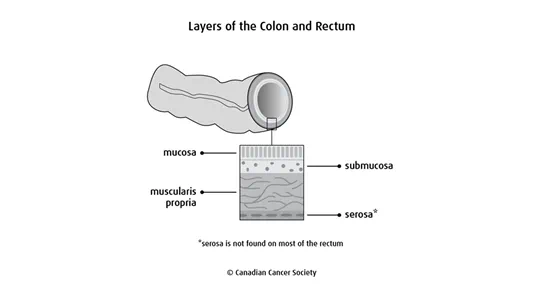Stages of colorectal cancer
Staging describes or classifies a cancer based on how much cancer there is in the body and where it is when first diagnosed. This is often called the extent of cancer. Information from tests is used to find out the size of the tumour, which parts of the colon or rectum have cancer, whether the cancer has spread from where it first started and where the cancer has spread. Your healthcare team uses the stage to plan treatment and estimate the outcome (your prognosis).
The most common staging system for colorectal cancer is the TNM system. For colorectal cancer there are 5 stages – stage 0 followed by stages 1 to 4. Often the stages 1 to 4 are written as the Roman numerals I, II, III and IV. Generally, the higher the stage number, the more the cancer has spread. Talk to your doctor if you have questions about staging.
When describing the stage, doctors may use the words local, regional or distant. Local means that the cancer is only in the colon or rectum and has not spread to other parts of the body. Regional means close to or around the colon or rectum. Distant means in a part of the body farther from the colon or rectum.
Find out more about staging cancer.
The colon and rectum are made up of different layers of tissues. The stage often depends on which layer the tumour has grown into.

Stage 0 (carcinoma in situ)
The cancer cells are only in the inner lining of the colon or rectum (mucosa).
They may be in the
Stage 1
The tumour has grown into the layer of connective tissue that surrounds the mucosa (submucosa) or into the thick outer muscle layer of the colon or rectum (muscularis propria).
Stage 2
Stage 2 can be divided into stages 2A, 2B and 2C.
For stage 2A, the tumour has grown into the layer of tissue between the muscularis propria and serosa, or it has grown into tissues beyond the muscularis propria (when there is no serosa).
For stage 2B, the tumour has grown through the membrane that covers and supports the colon and rectum (called the serosa or visceral peritoneum).
For stage 2C, the tumour has grown through the wall of the colon or rectum and into other organs or areas, such as the bladder, prostate or uterus.
Stage 3
There are cancer cells in lymph nodes near the colon or rectum. Stage 3 can be divided into stages 3A, 3B and 3C depending on where the tumour has grown and how many lymph nodes have cancer.
Stage 4
The cancer has spread to other parts of the body (called distant metastasis),
such as to the liver or lungs. This is also called metastatic colorectal cancer.
The cancer may be in only 1 organ or in distant lymph nodes (stage 4A). It may
be in more than 1 organ (stage 4B). The cancer may be in the
Recurrent colorectal cancer
Recurrent colorectal cancer means that the cancer has come back after it has been treated. If it comes back in the same place that the cancer first started, it’s called local recurrence. If it comes back in tissues or lymph nodes close to where it first started, it’s called regional recurrence. It can also recur in another part of the body. This is called distant metastasis or distant recurrence.
Your trusted source for accurate cancer information
With support from readers like you, we can continue to provide the highest quality cancer information for over 100 types of cancer.
We’re here to ensure easy access to accurate cancer information for you and the millions of people who visit this website every year. But we can’t do it alone.
Every donation helps fund reliable cancer information, compassionate support services and the most promising research. Please give today because every contribution counts. Thank you.
